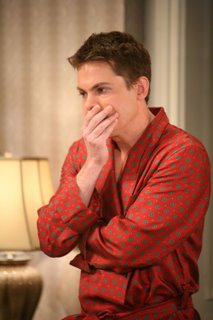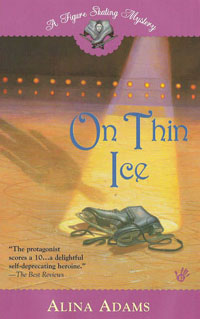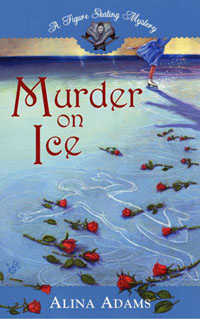Tatiana Tarasova: “A little bit longer and I can step aside.”Translation of an interview by Elena Voitsekhovsky (EV) printed in the Russian language publication Sport Express on January 30, 2009 In her presence, I have always felt awkward to complain about my life. Even when I wanted to do it very much -- we all from time to time have problems that seem to be impossible to solve -- Tatiana Tarsova (TT) would never allow people around her even to suspect that she had any problems. Last year, she regularly appeared on TV screens - beautiful, assertive and full of energy -- as if her car were not stolen and her home not burglarized. When I touched on that subject in my interview she brushed it off: “It is all such a nuisance, just nonsense compared with the situation when someone close to you is seriously ill.”
All of last year she saved herself by immersing herself in her work. She was stretched very thin between her home and the rink, periodically traveled to competitions. She was consulting someone and staging programs for others. People came to her for help from all over the world. We met at the rink after her return from Helsinki’s European Championship.
EV – Tatiana, did you like what you saw in Helsinki?
TT – I think that, except for men’s skating, and especially the performance of Sergey Voronov, we reached the maximum of our abilities, considering our current situation.
EV – What do you think happened to him?
TT – Sergey is a talented skater, and his coach is very talented as well, but what I saw in Helsinki leads me to think that he is not working hard enough. No one else of the leading skaters runs through their complete programs only once a week. They polish their programs every day – the short one in the morning and the free program in the evening. Specifically how to practice is supposed to be decided by the athlete and the coach. I saw recently how Alexey Urmanov works with his students. They looked good. Voronov was just not ready for the current season. In Helsinki, he did not show any elements of his program at the practices and warm-ups when judges were present. Sergey is a talented person, but not a great athlete. Only athletes win competitions.
EV – As long as we touched upon that sad subject I would like to ask you what in your opinion happened with Maxim Shabalin in Helsinki?
TT – For a long time, I did not have any information about the pair of Domnina-Shabalin. Everything was a secret. In reality, after two operations, his leg was in bad form, and at the end of last season he went to Germany for rehabilitation. It was the right move, in which I assisted by helping to organize the trip. Last fall I wanted to go to the States to see how they were getting ready to this season, but I was not allowed to go. Natalia Linichuk, who was coaching the pair after they left Gorshkov, told me that she needed some more time to work with them before I could see them. I believed that she was a good coach and she knew what she was doing. If she decided to take him out of the competitions, she had her reasons for it.
EV – But did you agree with that decision?
TT – I was against it.
EV – Why?
TT – Maybe because I always think as a maximalist. I always thought that an athlete should not withdraw from competition if he decided to compete. Maxim went on the ice in Helsinki, he was seen by the judges. One practice was not very successful, but the other was normal. Everything that they were supposed to do, they did. They fell in the compulsory program and the coach took them out of the competition. The other Russian pair, Chochlova-Novitsky, coached by Alex Svinin and Irina Zhuk performed very well and I was happy for them.
EV – But maybe Shabalin had too much pain in his leg?
TT – Why no one thought about that when he was allowed to go on the ice on the 9th day after an operation? Whatever happens now is normal. A knee operated on twice will never work as normal. There will always be something wrong and the athlete has to learn to overcome the pain and work with it, or quit the sport.
EV – I know that you watch the performances of the young coaches. I was happy in Helsinki for your student Evgeny Platov and his British dance team. In all of the previous years it seemed that Platov was somewhat upset that his pair was not taken seriously. Could you explain why it took him so long to be successful?
TT – It was not that long. Evgeny completed his skating career not long ago. He left amateur sports in 1998 and for some time he participated in professions competitions with Maya Usova. Thrn he spent 3 years as my assistant, and only then he started his own coaching career. Coaching requires not only knowledge, but patience as well.
EV – Did you think that way when you started your coaching career?
TT – My situation was different from the very beginning. I started working with sportspeople when I was 19 and I did not think at all how long it would take before I would see any results. Platov was a two times Olympic Champion. He came to coaching after a huge sporting success, and in coaching work he wanted a similar success. The waiting looked long to him. About a year ago, I was talking to his mother and told her not to worry, he would be fine.
EV – Why were you so sure?
TT – Because I saw how he was progressing. He likes to work on small things. He taught his skaters to skate, to love figure skating and to understand it. This is a great coaching art. But the most important thing was that Evgeny learned together with his students the things that he did not understand before. He has a nice pair of juniors. Alex Zhulin also has some nice juniors. There are other good coaches – Elena Kustarova, Svinin, Zhuk. They are that young generation of coaches that I've waited for, for so long. A little bit longer and I can step aside with a light heart.
EV – We talked about this issue in Turin. You told me then that you were forced to stop working with Shizuka Arakowa because you lost your coaching patience without which there is nothing to do in the big sport. But now you are working with another Japanese skater, Mao Asada. How serious is this cooperation?
TT – I am working less with Mao than I worked with Shizuka, but only because I am in such a predicament that I have to take care of my ill relatives. I can not be permanently in Japan. Mao spent all summer in Moscow with me. The short program of this season she choreographed in Canada with Lori Nichol and I should say that it was a great achievement of the choreographer. I created her free program. I suggested to include in it two triple axels. Her fist trials, especially the jumps, Asada worked on with me. When I realized that Asada could perform both axels and the rest of the program did not suffer, we decided to leave these elements in the program. At this time my assistant, Janna Folle, is working with Asada in Japan. We talk on the phone every day, so I am informed on everything that is going on there. When I can I come over there and I try to go to all of the competitions with her.
EV – Does the Figure Skating Federation of Japan control your work or get involved in it?
TT – As far as I know the decision to change coaches Asada made by herself together with her mother and her manager who runs all of her affairs. When they approached me, I set two conditions - that I would be provided an interpreter and they would hire an athletic trainer. These requests were satisfied.
EV – How many programs did you create this summer?
TT – Janna and I created two programs for Evan Lysacek– he was sent to Russia by his coach Frank Carroll specifically for that purpose. Two more programs were staged for Canadian Kevin Reynolds, who came over with his coach and Joann McLeod, who is also my friend. I also helped my Russian colleague Elena Vodorezova to stage her programs.
EV – Are you still being reproached for working with foreign skaters on Russian ice?
TT – I think that now this point of view outlived itself. The specialists all over the world are working with people who can pay.
EV – For the last 3 years you are working on the ice project of the first channel of TV. Will you continue this collaboration next season?
TT – There are 8 programs scheduled for the near future. I am very proud to participate in this program. I think that it is the best program on our TV.
EV – Is it possible that this TV program would influence the big sport?
TT – But of course. Zhulin is working in the TV program and is also coaching the French dancing pair Natalie Peshala/Fabjen Burza and I think that their free program came out very well.






